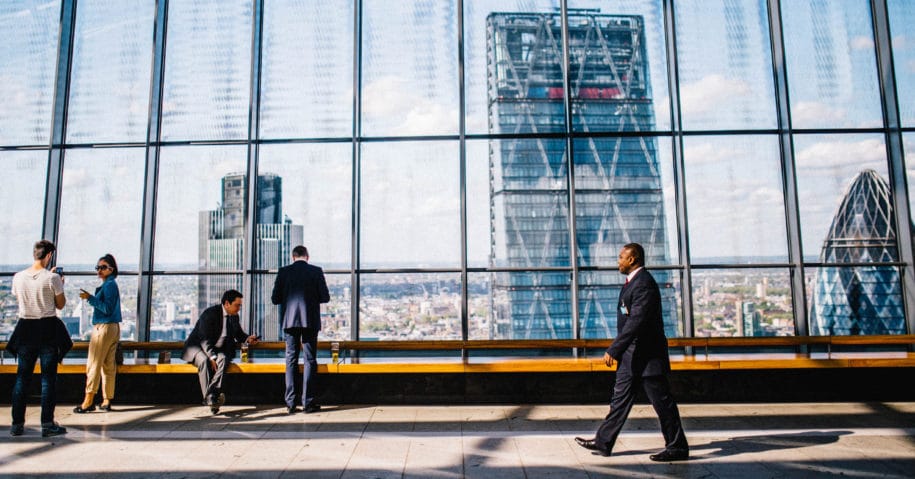6 Companies Leading the Future of Corporate Social Responsibility
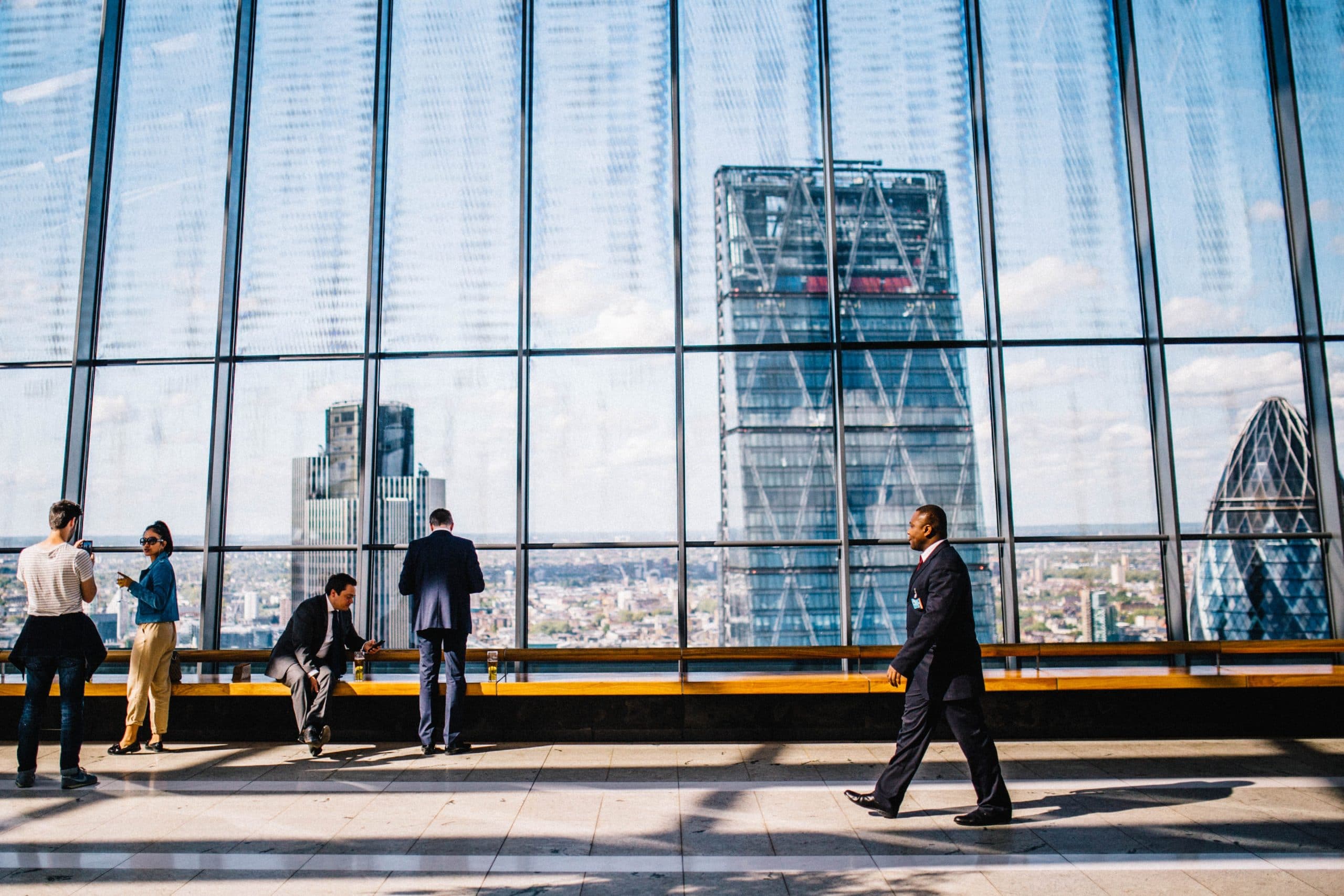
This is the third in an ongoing series of blogs exploring the meaning, implementation, function and future of CSR.
In our previous blog, we covered the financial benefits proper CSR implementation can bring a company. With correct usage, corporate social responsibility is extremely beneficial to a company’s bottom line, investing in new technology while strengthening brand image and values. Efficient application of CSR helps businesses build toward the future, focusing on longevity and sustainability over short-term gains.
Now that the definition, function and benefits of corporate social responsibility have been highlighted, it is important to showcase companies which are leading the pack in social responsibility. Every company’s CSR program is unique because every company has its own goals, history and identity. Despite this, paying attention to what CSR-committed companies are doing helps CSR leaders discover creative ways to implement social responsibility within their own businesses and organizations. To assist with this, we have compiled 6 companies which serve as amazing examples of how to authenticity and efficiently achieve the triple bottom line, leading the future of responsible business practices.
1. B Lab
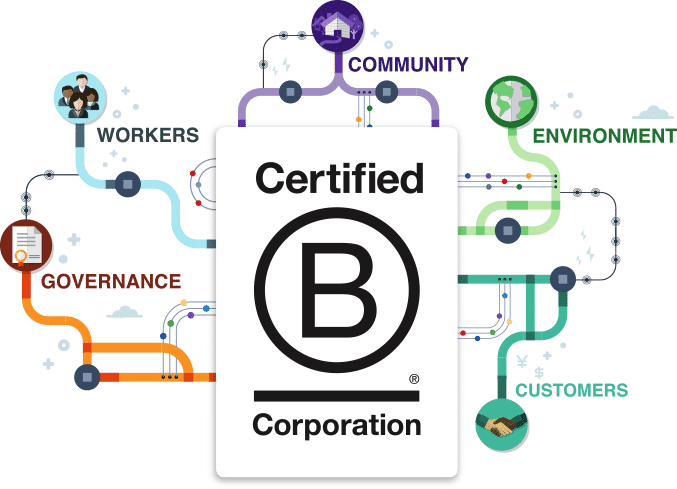
B Lab is a non-profit organization, which separates them from the other corporations on this list. However, their commitment to guiding companies toward the path of sustainability makes them essential reading for anyone implementing CSR practices into their company. With over 3,500 certified B Corporations, B Lab has built their certification up to a gold standard of ethics, acting as a beacon of sustainability for much of the business world.
The secret to B Lab is their strenuous certification process, which all companies applying for B Corporation status must pass, then renew every few years. B Lab focuses on all aspects of a company, and only accepts applicants that display a clear passion for equality, the environment, and fiscal responsibility in their business practices. With this process, B Lab has created a collective of companies around the world which use their influence for positive change, making the B Corp certification a must-have for any business that is passionate about doing the right thing.
However, B Lab does not just focus on making companies more green and inclusive. Overall, B Corps are shown to be better fit for economic hardship, and often achieve long-term growth. The fiscal success of B Corps is also backed up by research, with one study finding “One- and three-year sales growth rates are significantly higher for B Corps relative to their matches.”
Even if your company is not interested in becoming a B Corp, the techniques and approaches that B Lab has pioneered continue to lead the business world in the triple bottom line. You can help B Lab lead the charge toward a better world by joining them on the B Lab Action Hub.
2. Ben & Jerry’s
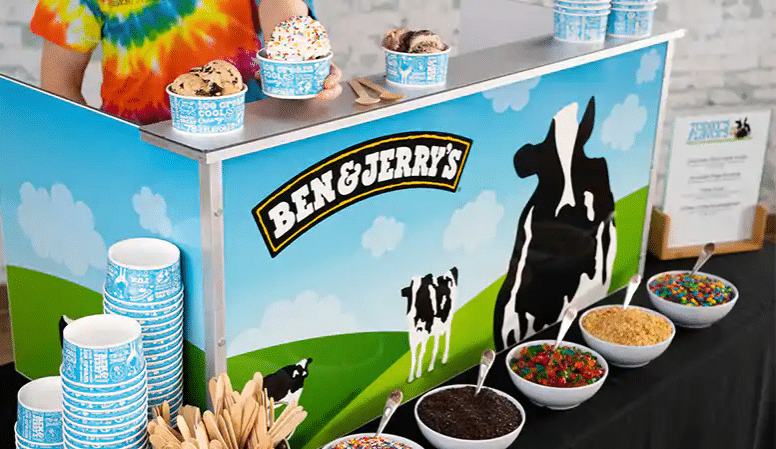
Ben & Jerry’s is one of America’s most beloved ice cream brands, famous for their unique variety of flavors, many created in partnership with celebrities. Since their inception, Ben & Jerry’s has harnessed their platform for motivating good. If there is one thing to be learned from the success of Ben & Jerry’s CSR program, it is the importance of change and relevance to evolving social, economic and environmental issues.
As times and standards change, so must companies, and Ben & Jerry’s is a case study in this principle. From climate change, to fracking, to the Occupy movement and racial justice, Ben & Jerry’s has consistently used their platform to advocate for worthwhile causes. With this approach, they are always on the forefront of the world’s many issues, leveraging their influence to be a voice of positive change and innovation.
Ben & Jerry’s CSR reflects the need for authenticity in corporate outreach. Never do their initiatives or actions come across as disingenuous, which builds strong bonds among their customers, employees and stakeholders. Ben Cohen (Ben of Ben & Jerry’s) once said, “the only thing that is a meaningful use of my life is to work to improve the quality of life for people who are disadvantaged,” and this belief is echoed in the actions and values of his company.
While CSR can be a tool for marketing, it functions best when performed in earnest, reflecting a deeply human desire to do good for others.
3. REI

Recreational Equipment, Inc. (REI) is a staple in outdoor recreation apparel; selling camping gear, sporting goods, and travel equipment for nearly a century. Since 1938, REI has not been a traditional brick and mortar retailer. Beginning as a co-operative between a handful of mountain climbers in Washington, REI has never lost its spirit of collectivism and adventure.
As one of America’s largest co-ops, REI’s millions of card carrying members directly influence the course of the company, ensuring its profit is equitably distributed and fairly used. In the 2019 fiscal year, REI donated over $8 million to 400 non-profits, and reached new heights by spending $100 million in cumulative philanthropic giving. As a company built around the outdoors, REI has always fought for the preservation of the planet, leading the industry in sustainable practices.
While most companies are not consumer co-ops, there is much to learn from REI. Like other CSR-focused companies, REI never prioritizes inflating profits. They see their business as a means of supporting worthwhile causes while making wise, long-term business decisions.
Notwithstanding this altruistic approach, REI’s model works, proving that a commitment to CSR principles can have tangible, fiscal benefits.
4. GAP

GAP is a classic American clothing brand, which has grown to a multi-billion dollar international brand in their half century of business. Among their thousands of locations, GAP also owns and operates Old Navy, Banana Republic and Athleta, making it a powerhouse in the clothing world. Despite their massive size, GAP has shown extreme devotion to their employees, customers and the planet.
GAP’s sustainability goals are long-term, and the company uses their immense market presence to enact positive change. They currently vow to eliminate single-use plastics from their supply line by 2030, become carbon neutral by 2050, and make massive strides to reduce water usage and waste production. GAP’s social responsibility programs are wide-sweeping, looking to address all issues throughout their supply chain. This is particularly true of their commitment to women’s rights, offering life-skills programs to help advance the careers of the women working in their stores and factories around the world.
As a Fortune 500 company, GAP is showing how large corporations can make incredible strides in CSR leadership. Customers are looking for companies to use their influence and profit to give back to employees, communities and the planet. GAP is clearly displaying how this can be achieved, even at an international level.
5. The Body Shop

A core principle of CSR is “do[ing] well by doing good;” meaning businesses “can make a profit and make the world a better place at the same time.” While many companies strive to live up to this ethos, few were founded on it. The Body Shop is one of those companies, with founder Anita Roddick boldly stating, “Business shapes the world. It is capable of changing society in almost any way you can imagine.” This approach to business informs The Body Shop’s business identity to this day, remaining focused on making a positive impact in the world.
As a beauty brand predominantly marketed to women, The Body Shop has always made it a goal to promote body positivity and to celebrate women of all sizes, colors and orientations. To them, cosmetics should be a reflection of inner beauty, not a means of encouraging unrealistic depictions of beauty. And that passion for people goes far past the products they sell, extending to the world in which they live.
Impactree has worked closely with The Body Shop on the creation of their Action Hub, which covers a variety of issues facing the world. From education on domestic abuse, to combating food waste and racism, The Body Shop uses their influence to promote positivity while advocating for social and governmental reform.
In terms of corporate social responsibility, The Body Shop shows how companies do not need to hyperfocus on one area of outreach, and can diversify their efforts to better align themselves with the passions of their employees and customers.
6. Patagonia
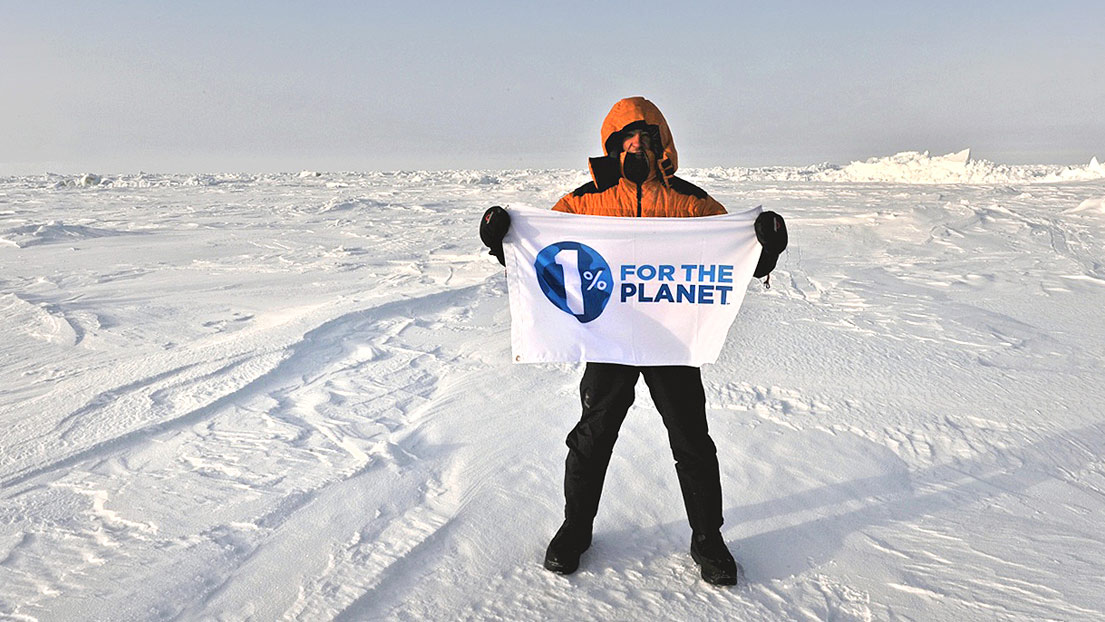
Clothing company Patagonia is known worldwide for their line of jackets and outdoor wear. However, even more well known is their Ironclad Guarantee, a robust return and repair policy that has grown public trust in the durability of their products. This commitment to the highest quality products possible was born from the desires and needs of Patagonia founder, Yvon Chouinard, who famously ran an ad in The New York Times declaring “Don’t Buy This Jacket.” “I’ve always felt guilty about making consumer things,” said Chouinard in the ad, “So I have a sense that it’s my responsibility to help people wear [our clothes] as long as possible.”
While Patagonia’s commitment to the longevity of their products has won over millions of customers, their passions extend far past clothes, focusing on the nature in which their products are made to be enjoyed. As they state on their activism page, “We’re in business to save our home planet.” Patagonia’s commitment to addressing climate change is extremely commendable, “self-impos[ing an] Earth tax, 1% for the Planet, provid[ing] support to environmental nonprofits working to defend our air, land and water around the globe.”
Patagonia is a testament not only to how CSR can dictate a company’s direction, but to how corporate social responsibility can help a company prosper and build a base of devoted lifetime customers.
Leading the Future of CSR
The future of business is a strengthened devotion to the principles of corporate social responsibility. The world needs businesses to lead and motivate change, addressing the biggest issues of the modern age. Committing to CSR is a net gain for everyone: products are higher quality, employees have better work environments, companies make more money, and more funds are invested in technology and organizations creating pathways toward a fairer, cleaner planet for us all.
Every company addresses CSR in their own way, but there is much to learn from others. These 6 companies show the unique ways a company can orient itself around CSR, and offer invaluable lessons to any business trying to grapple with their own contribution to social, economic and environmental change. These companies not only show how to combine brand identity with corporate social responsibility, but the immense benefits of doing so.
We know that every company’s social responsibility goals are different. That’s why we’re here to help. Learn how you can take your business’s CSR to the next level with Impactree.
Next time we will be looking at greenwashing, why it is damaging to brand image, and how to avoid it by authentically implementing CSR principles.

